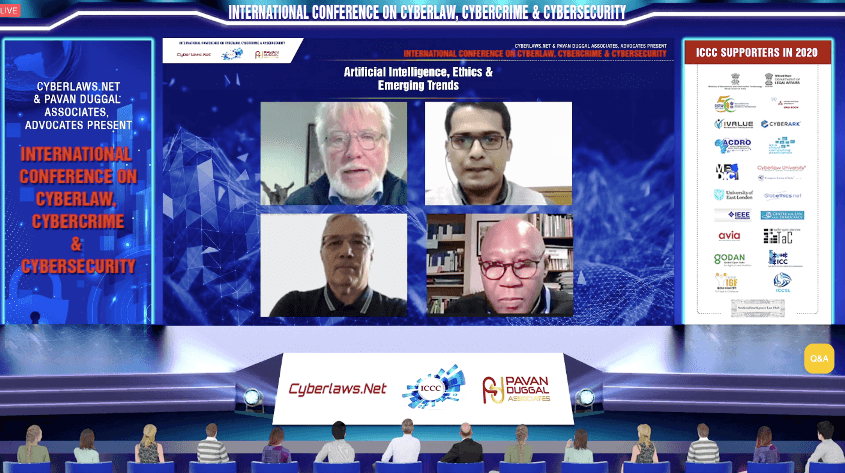
30th November, 2020
This year's International Conference on Cyberlaw, Cybercrime & Cybersecurity was organised by Cyberlaws.net, hosted virtually and directed by Cyber lawyer expert and Globethics.net Board member, Dr Pavan Duggal from 25 to 26 November 2020. The conference focused on addressing distinct COVID-19 cyber challenges, and covered a total of 55 topics. Globethics.net Executive Director, Obiora Ike spoke at the session titled 'Artificial Intelligence, Ethics & Emerging Trends', which was chaired by Globethics.net President and Founder Christoph Stueckelberger.
Artificial Intelligence (AI) has become a major driver globally, and this session aimed to open the box and reflect on the values that drive the responsible use of AI. Obiora Ike noted that artificial is the opposite of natural, and as human nature symbolises the natural, AI should be used as an aid and not replace the maker. He shared his concerns with humans 'becoming the victim of our own product', and the need for legal and ethical frameworks. Development of AI technologies must include ethical values, purpose, principle, character and disposition. In order to establish ethical compliance, Obiora Ike noted that one must ask the following questions:
• Does it cause harm?
• Is it benevolent?
• Is it healthy?
• Is it efficient?
• Does it have respect for the autonomy of the human person?
• Does it serve justice and fairness?
• Is it proportionate?
Prof. Dr Udo Helmbrecht, Honorary Professor at the Institute for Technical Computer Science, talked about the evolution of AI technologies, transitioning from chip technology to cloud storage services. With this evolution, he spoke from an IT security perspective, posing questions such as, 'what information should be stored in premises and what information should be stored in the cloud, what it the computer architect of the future?'
He noted that building trust was vital to maximise the use of products, but also to ensure safe generation, transmission and storage of digital data. With the rise of the 'Internet of things' and everything becoming increasingly connected, Bishwa Kalyan Dash, Asst. Prof. of Law at Nirma University also discussed the challenges this poses for the law. Key points such as machines as a legal personality, property and who takes liability for the damage that can be caused by AI technologies were discussed.
Ethical balance offers a unifying standpoint between technophobia and techno euphoria, and emphasis was placed on the need for 'technological humanism'. This concept refers to placing human concerns at the centre of development and placing people before objects. Whilst AI technologies have the immense innovative capacity, it must also be linked to responsibility. Obiora Ike concluded that we must ensure a holistic and multi-disciplinary approach to the development of AI technologies, so that we may 'think, act and govern ethically.'




